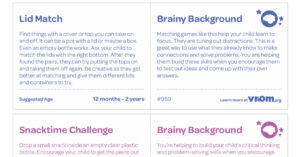Posts Tagged ‘ECE’
Science in Everyday Moments
Young children are curious about the world around them. Through the everyday moments you already share, you’re helping your child learn like a scientist. Our partners at Vroom have some brain builders to help you turn nature into a classroom!
Read MorePromoting Healthy Sleep Habits
As early childhood experts, you understand that sleep is not just rest—it’s foundational for healthy development in young children, and it affects everything from brain growth to emotional regulation and physical health. Well-rested children are better able to learn, concentrate, and manage their emotions which are all important for school readiness. Our partners at Child Care Aware of America have some tips to make sure those in your care are well-rested. Plus, find resources from our partners at AAP and Sesame Street in Communities!
Read MoreNCA Joins Early Childhood Educators at TXAEYC in Frisco, TX
When two entities focus on a common mission, anything is possible. The National CACFP Sponsors Association (NCA) sees its mission align with the Texas Association for the Education of Young Children (TXAEYC) without a hint of deviation: To ensure those serving children are provided with the resources needed to help them sprout to unimaginable heights.
Read MoreLearning Disabilities and Differences
October is Learning Disability Awareness Month. Children learn many skills in life—how to listen and speak, for example, or how to read, write, and do math. Some skills may be harder to learn than others. If a child has had appropriate learning experiences and instruction, but is not able to keep up with peers, it’s important to find out why and how to help. Our partners at the American Academy of Pediatrics have a blog to help caregivers and parents understand learning disabilities and differences.
Read MoreGardening with Children
Introducing children to gardening can be an enriching experience that fosters a love for nature and promotes an acceptance of healthy foods. The Institute of Child Nutrition’s Mealtime Memo discusses how to engage children in gardening activities to increase their knowledge and acceptance of healthy, local foods.
Read MoreECE Nutrition and Physical Activity Practices Decreased During Pandemic
A report published in the Journal of Public Health Management & Practice examined changes in nutrition and physical activity-related best practices in ECE settings in Illinois from 2019 as compared to 2022.
Read MoreBetter Together Family Cafes
As a child care provider, you are dedicated to the health and well-being of children. While the care that you provide for these children is crucial, their interactions and experiences at home are just as important. Having a strong relationship with families can have a positive impact on the well-being of those in your care. Our partners at Nemours have developed Better Together Family Cafes as an effective family engagement model.
Read MoreLeveraging CACFP for Farm to ECE
When combined, the CACFP and Farm to Early Care Education (Farm to ECE) activities can have an extraordinary impact on children, child care providers, and local communities. FRAC’s report aims to support child care providers to access CACFP and utilize it for eligible Farm to ECE activities by highlighting the mutually beneficial synergy between these initiatives.
Read MoreCACFP Indicator for State-Level Obesity Prevention
The CACFP is an indicator for state-level obesity prevention. The inclusion of the CACFP as an indicator for obesity-prevention shows that the CACFP is an important, recognized factor for proper development in the earliest stages of life.
Read MoreBarriers and Facilitators of Center-Based ECE Program Participation in the CACFP
In April 2023, the Indiana University CACFP Project Team published a study on the barriers, facilitators, and potential strategies to address center-based participation in the CACFP. One of the key barriers to participation shared by study participants included the cumbersome CACFP paperwork. Facilitators to participation included supports provided by stakeholders and sponsors.
Read More









